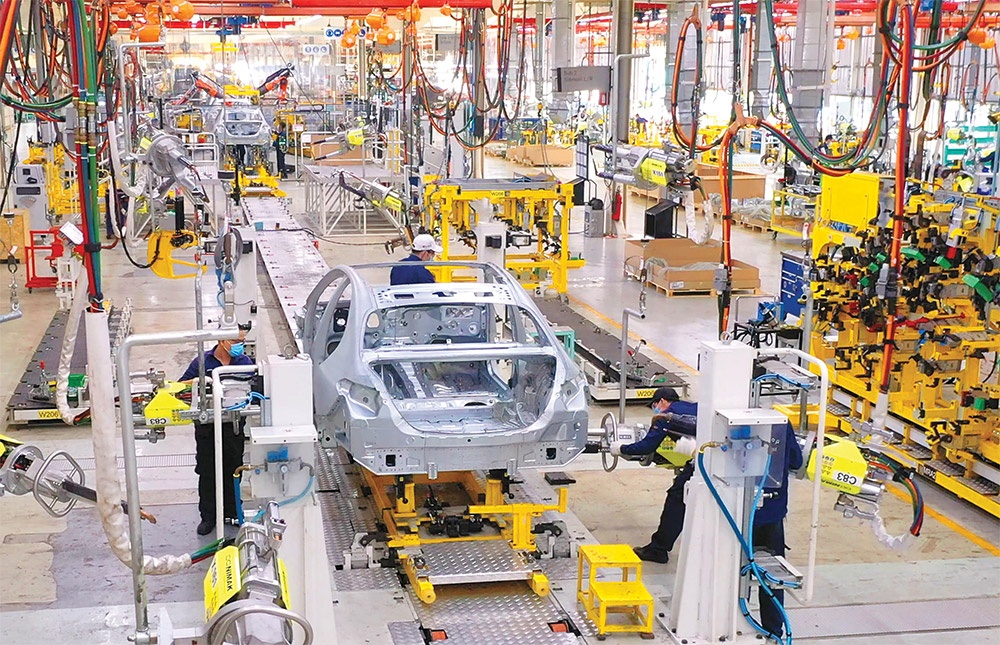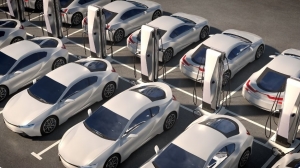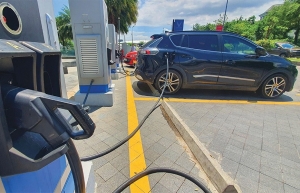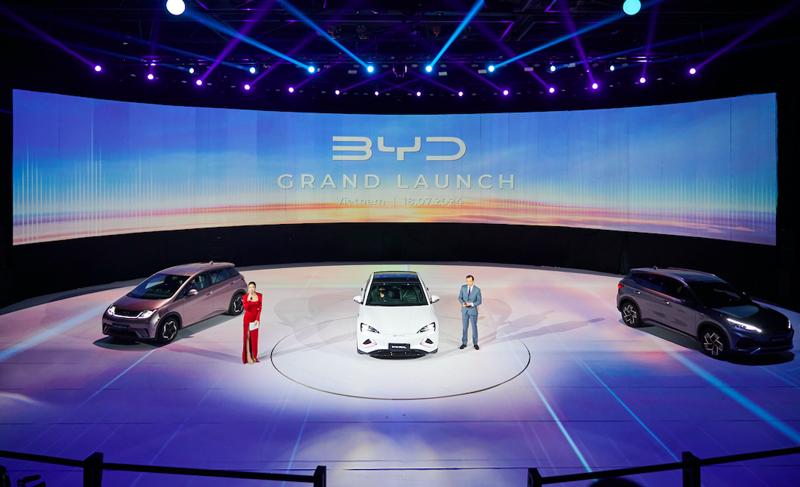China’s EV inroads ring alarm bells
Car production in Thailand, a regional auto-making hub, dropped for the 11th straight month in June, according to a report by its Ministry of Industry.
 |
| The Unites States, Europe, and others are adding tariffs to prevent mass influx of cheap Chinese electric cars, Photo Le Toan |
At the same time, Honda Motor, Japan’s second-largest carmaker, announced in July that it would stop production at its Ayutthaya plant in 2025 to consolidate operations at its Prachinburi plant. The company plans to reduce its annual production capacity in Thailand from 270,000 vehicles to 120,000.
Other Japanese carmakers, such as Subaru, have announced plans to cease production by the end of this year, followed by Suzuki in 2025.
This movement is part of the tough competition from cheap Chinese electric vehicles (EVs). In response, Thailand’s Ministry of Industry recently requested Chinese EV manufacturers to assemble their vehicles with at least 40 per cent of parts sourced locally to support the automotive supply chain.
The surge in Chinese car sales in Thailand can largely be attributed to the Thai government’s promotion of EVs. In 2021, it said it wanted EVs to account for at least 30 per cent of its automobile production by 2030, while actively encouraging investment by promising economic incentives, such as subsidies and excise tax reductions for imported EVs, provided that those businesses committed to commencing assembly in Thailand by next year.
The massive EV oversupply has sparked a major price war in the market, affecting petrol vehicles as well. Many manufacturers have been forced to cut production or even close factories.
According to the Thai Excise Department, over 185,000 EVs have been imported since 2022. However, data from the Land Transport Department showed that new EV registrations have stood at just 86,000, suggesting that at least 90,000 EVs are still in oversupply.
Meanwhile, according to Reuters, the US Commerce Department is expected to release new regulations in August imposing restrictions on Chinese-made vehicles. To prevent China from flooding the market with low-cost EVs, the Biden administration is increasing its scrutiny of Chinese auto imports.
In May, the US quadrupled tariffs on EVs built in China, while in June the EU said it would impose tariffs of nearly 40 per cent on Chinese EV imports into the bloc.
Nguyen Chi Sang, chairman of the Vietnam Association of Mechanical Industry, said, “Chinese-made EVs pose challenges for the market. The expansion of Chinese EV manufacturers comes in the context of oversupply in China and newly announced tariffs in the US. Many countries have implemented measures to protect their domestic markets.”
In the first half of 2024, Vietnam imported nearly 75,000 cars of various types, with a turnover value of more than $1.5 billion. Indonesia led in terms of car volume with over 26,200 vehicles, valued at $380 million. Thailand ranked second with 18,500 vehicles worth $357 million, followed by China with 11,900 vehicles valued at $373 million.
While the growth rate of EVs is slowing in Europe, the demand in Vietnam is increasing, thanks to contributions from domestic and imported brands. According to forecasts, the market share of electric cars in Vietnam could reach 15 per cent by the end of 2024, ranking second in Southeast Asia, according to the Vietnam Automobile Manufacturers Association (VAMA).
“Chinese car manufacturers can produce cheap electric cars, with retail prices ranging from only $10,500-11,250. These affordable products may soon be imported and distributed in the Vietnamese market,” VAMA said.
VAMA noted that the pressure from imported cars on domestically assembled ones was increasing. Following the removal of import taxes on completely built-up cars from ASEAN in 2018, many domestically assembled products have struggled to compete with those from countries like Thailand and Indonesia. From 2025, when the import tax on cars from the EU and the United Kingdom is reduced to 30-35 per cent, the advantage for domestically assembled cars will diminish further.
“The reason why electric cars from China are entering Vietnam effortlessly is that we do not have a process or standards for assessment and control,” said Dr. Vo Duy Thanh from Hanoi University of Science and Technology. “Without technical standards, cheap imported electric cars risk explosion and unsafe operation on the road.”
He pointed out that while the wave of Chinese EVs entering Vietnam is just beginning, it reminds consumers of the late 90s when cheap Chinese motorbikes flooded the Vietnamese market. By offering prices as low as one-third or even one-quarter of Japanese motorbikes, Chinese variants initially dominated the market. However, in just a few years, Chinese motorbikes lost their position and nearly disappeared altogether.
In the array of products introduced to Vietnamese customers in July, the number of EVs is twice that of vehicles using traditional engines.
On July 18, China-based BYD announced the prices of its first three car models in Vietnam. It had previously reported spending about $250 million to build an electric vehicle assembly plant in Vietnam, hoping for favourable investment conditions. However, the company postponed the investment and decided to import cars to Vietnam for sale.
 | Electric vehicle growth to accelerate over the longer term A recent Citi Research report sees electric vehicles’ global volume growing modestly this year but after that, it’s pedal to the metal. |
 | New partnerships mooted to enhance e-vehicle prospects New solutions could help capitalise on the upswing in electric vehicles in Vietnam, signifying new development of the country’s fledgling e-car ecosystem. |
 | VinFast opens first three dealerships in the Philippines Following its expansion into Indonesia and Thailand earlier this year, VinFast has launched in the Philippines. |
 | Raft of Chinese electric vehicle groups expand into Vietnam Many Chinese brands have unveiled electric vehicles in Vietnam but charging infrastructure remains a significant concern for buyers. |
What the stars mean:
★ Poor ★ ★ Promising ★★★ Good ★★★★ Very good ★★★★★ Exceptional
Related Contents
Latest News
More News
- Hermes joins Long Thanh cargo terminal development (February 04, 2026 | 15:59)
- SCG enhances production and distribution in Vietnam (February 04, 2026 | 08:00)
- UNIVACCO strengthens Asia expansion with Vietnam facility (February 03, 2026 | 08:00)
- Cai Mep Ha Port project wins approval with $1.95bn investment (February 02, 2026 | 16:17)
- Repositioning Vietnam in Asia’s manufacturing race (February 02, 2026 | 16:00)
- Manufacturing growth remains solid in early 2026 (February 02, 2026 | 15:28)
- Navigating venture capital trends across the continent (February 02, 2026 | 14:00)
- Motivations to achieve high growth (February 02, 2026 | 11:00)
- Capacity and regulations among British areas of expertise in IFCs (February 02, 2026 | 09:09)
- Transition underway in German investment across Vietnam (February 02, 2026 | 08:00)

 Tag:
Tag:




















 Mobile Version
Mobile Version